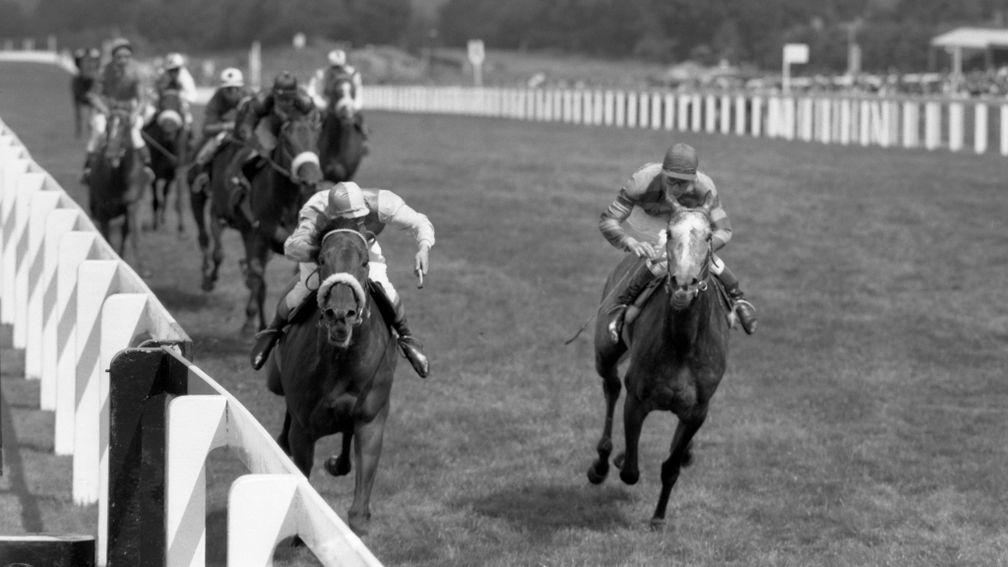- More
Jimmy Lindley: 'I rode against some of the greatest riders racing has ever seen'

Jimmy Lindley, the Classic-winning jockey turned popular broadcaster, has died aged 86. In an entertaining interview first published online in May 2020, Jonathan Harding spoke with the former top jockey about his life in racing.
Jimmy Lindley is a gifted storyteller with a lifetime of material.
The Classic-winning jockey and broadcaster, who celebrated his 85th birthday on Saturday, has a seemingly endless supply of anecdotes at his fingertips and paints a vivid picture of a bygone era of racing.
His memories may span decades but he plucks them to the surface with ease and soon first-hand details of the characters and horses who helped shape the sport come pouring down the phone.
After the briefest of preambles, his story begins. Lindley was born in South Kensington in 1935 but two years later he moved to Eastbourne, which was badly affected by the second world war.
"A bomb flattened our house and we were buried for eight hours," he says, choosing to open proceedings with one of his more staggering tales. "We were lucky to live really. We moved further up the road and bugger me if another bomb didn't blow the windows out.
"Eastbourne had it really bad. The German planes used to come over and when they couldn't make it to London they'd drop their bombs on the south coast. I used to go out at night and watch the Battle of Britain. It was like bonfire night and you never saw the danger.
"I went to live with my grandmother in Kent and a bomb landed in the garden there too but fortunately it didn't knock the house down. I suppose you could say I was three times lucky during the war."
Lindley began honing his riding skills as a child in Eastbourne. He would ride the pony that pulled the local milkcart and jokes that some of the racehorses he rode would have better suited the role.
At 14, he took his first steps towards becoming a jockey, joining trainer Tom Masson as an apprentice in 1949. Three years later he rode his first winner, Sweet Phoenix, for Harry Hannon at Brighton.
"Everything went well for a few seasons and I lost my allowance pretty quickly but then I went to ride in India in the mid-1950s and my weight went sky high so the rides trickled away," he recalls.

Lindley admits he struggled with his weight throughout his career but there is not even a trace of bitterness in his voice. As one door temporarily closed, he took it upon himself to force open another.
He joined his future father-in-law Matthew Feakes for a season over jumps and, as well as rubbing shoulders with the likes of Fred Winter, managed to finish third in the 1958 Champion Hurdle.
"That season toughened me up," reflects Lindley. "Then Towser Gosden said he had an awkward horse for me to try. He was a big, burly colt but we got on. That was Sir Harold Wernher's Aggressor and we won the 1960 King George VI and Queen Elizabeth Stakes."
By this point Lindley has hit his stride. During the 1960s he was at the height of his powers and he can recount every big winner, and surprisingly their breeding, as if they had passed the post yesterday.
"I won every race on Charlottown apart from the ruddy Derby," he says, seemingly able to see the funny side 54 years later. "I was claimed to ride Black Prince, who was third, but they didn't let me off him. Charlottown was probably one of the best horses I ever rode."
There are a few notable contenders for that title. Lindley next nominates the Jeremy Tree-trained Double Jump, a top juvenile who landed the 1966 Prix Robert Papin but never ran at three.
Conversation then turns to the indomitable Brigadier Gerard, who he rode in his early work for Dick Hern but never partnered in a race.
"I rode his dam La Paiva in her only start and she was absolutely useless but quite gutsy," he adds. "She was owned by John Hislop and I told him I wasn't being rude but if she wins I'll grow a beard."
Great Racing Mysteries: how on earth was Brigadier beaten?
Lindley won the St Leger in 1964 with Indiana and twice landed the 2,000 Guineas with Only For Life (1963) and Kashmir (1966), although he admits he cannot take full credit for the last one.
"Kashmir won some nice races in France but was a six-furlong horse really," he says. "Charlie Smirke [jockey] probably helped me win the race. He told me he doesn't get a mile and told me to ride him similarly to how he had ridden Palestine to win the Guineas in 1950.
"He said when you get to the Bushes make sure you get first run on them and the plan came off perfectly. If he knew you had a chance he'd give you advice and he, of course, was usually correct."
Lindley discusses his old weighing room colleagues such as Lester Piggott and Sir Gordon Richards with obvious fondness and clearly cherishes the relationships they forged away from the heat of battle.
"Gordon was a great character," he says. "He was a hard man to beat in a finish too and horses found another leg for him with 20 yards to go – it would often catch you out. I was lucky to ride against some of the greatest jockeys the sport has ever seen."
Lindley was known for his powerful finishes – his three Classic victories were decided by photos – but he had style too. He was taught early that riding was an art form and had a great teacher in Masson, who trained showjumpers for circus owner Bertram Mills.
"You can be too strong with horses," he reasons. "It's like winding up a clock. If you overdo it, you snap the spring. If you try to exceed their maximum speed, they change their legs and lose momentum.
"I believe jockeys are riding far too short now and bounce around too much. The younger ones would probably call me Grandad for riding long but it's about the styles of the time. We've got brilliant jockeys though in the likes of Ryan Moore and Frankie Dettori.
"The thing about Dettori is he cannot see anybody better than him and you always have to believe that as a jockey. Once you think somebody is better it's time to pack up. It's about confidence."
'They tell me to mind my own business'
Lindley called time on his career for a different reason in 1974. Aged 39, his efforts to maintain his weight had taken their toll but he was offered a role at the BBC, where he spent years as a paddock man.
"I enjoyed it when I was doing it with horses from families I'd ridden but it wasn't the same having to do it out of the book," he reflects. "I met some lovely people, including Sir Peter O'Sullevan. He always used to come up and tell you if you had a chance in a big race.
"I don't follow racing as closely as I used to but I still love it. My grandson knows much more about it than I do and my wife Pat is about six lengths in front. They tell me to mind my own business. I live near Lambourn so I often visit Barry Hills. His son has carried on the tradition so I pop over whenever I can and annoy them."
Lindley is not the type to sing his own praises so when he is asked to reflect on his contribution to racing, his first instinct is to give due credit to the trainers and fellow jockeys who he met along the way. It was their confidence in him, he says, that made all the difference.
This selflessness extends to the interview too. His parting message is that he hopes to have provided enough information to work with. Of course, he certainly has, but you cannot help but get the feeling this storyteller will always have a few more tales hidden up his sleeve.
Read these next:
Classic-winning jockey and popular broadcaster Jimmy Lindley dies aged 86
Jimmy Lindley obituary: a riding great renowned for his style, tactical nous and strength

Over 50% off Racing Post Members' Club!Members' Club is the only subscription racing fans and punters need in order to stay informed and make smarter betting decisions. Features include early access to the Racing Post digital newspaper, exclusive news and interviews, premium tips and form study tools to assist with betting. Select 'Get Ultimate Monthly' and enter code TRYME to get your first month for just £14.99* – that's better than half price!
If you decide that Members' Club is not for you, then you can cancel at anytime by contacting us.
*Members' Club Ultimate Monthly first month will be charged at £14.99, renews at full price thereafter
Published on inInterviews
Last updated
- 'You can see why people end up struggling - when you're trying to pay the electric bill, losing one ride can be massive'
- 'I've never paid six figures for a horse and never will - I learned pretty quickly you're only one phone call away from f*** all'
- 'I’ve trained some fabulous horses, worked with some excellent riders - maybe I have brought a little bit of talent to the table as well'
- ‘When you’re in the moment and you’re starved, you’re ready to explode - everything built up and I just lost my s**t’
- 'He must have his breakfast earlier than Willie does' - Patrick Mullins goes behind enemy lines at Gordon Elliott's yard
- 'You can see why people end up struggling - when you're trying to pay the electric bill, losing one ride can be massive'
- 'I've never paid six figures for a horse and never will - I learned pretty quickly you're only one phone call away from f*** all'
- 'I’ve trained some fabulous horses, worked with some excellent riders - maybe I have brought a little bit of talent to the table as well'
- ‘When you’re in the moment and you’re starved, you’re ready to explode - everything built up and I just lost my s**t’
- 'He must have his breakfast earlier than Willie does' - Patrick Mullins goes behind enemy lines at Gordon Elliott's yard